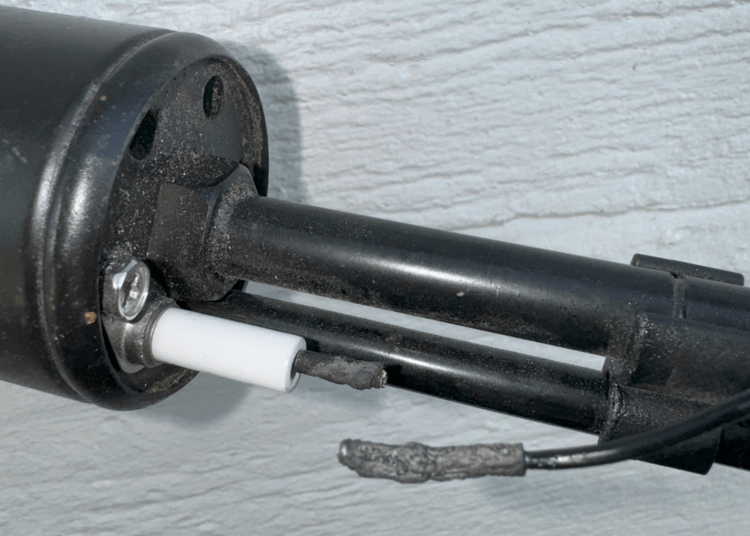Piezo Electric: The Spark that Makes it Go and How it Gets There
Piezoelectricity is the phenomenon where certain materials generate an electric charge when subjected to mechanical stress... namely, your finger!
Grillgun's and SuVGuns do not have batteries and do not need to be charged or lit externally. Instead, when you press the trigger in your gun, a piezoelectric reaction occurs inside the gun and the resulting electric charge is sent down to the bell of your gun, sparking the gas and generating the awesome blue flame that we all know and love.
If you're encountering troubles in this area, there's a few things that you can check to fix the problem.
First things first: the spark created is small... just enough to ignite the gas swirling around in the bell of your torch. Often when people have ignition issues, their gas is turned up too high. You only need a trickle of gas to ignite your torch. Try opening the Red Knob 1/16th to 1/8th of a turn.... that should get you a more consistent ignition in one or two clicks. Anything more than that will take several clicks to ignite, if it ignites at all. You should never need to light your torch externally with a lighter... it does every part of the ignition process on its own.
If your gas is trickling, with no sign of fire when you pull the trigger, it's time to take a more serious look at this ignition situation. First, disconnect your propane bottle or hose. These following steps should never be done when you have fuel connected to your gun... save the fire for when you're not looking down the barrel.
See attachment below
To determine whether the electric spark is making it to the ignition point, take your torch into a dark room and (again, without any propane connected) pull the trigger while looking into the bell. You should see a spark flash behind the moving diverter rod (it looks like a hooked spoon). The spark is tiny. If you see any flash at all, then you should be sparking properly. Make sure to keep your finger away from the white igniter on the fire bell while doing this, otherwise you might be in for a small shock.
If you don't see a flash, then it means there's an electric problem with your gun.
The electric charge that ignites your torch is carried by an external wire that feeds into the back of the fire bell of your gun through a white ceramic electrode. This wire is often mistreated or damaged by the environment around it, and it's one of the first places we look for trouble when we're trying to find an electric problem. Make a visual examination and ensure that the wire is not loose or disconnected from the back of the electrode. Lightly squeeze the end of the wire while it's on the electrode to tighten the connection and prevent disconnection if it is loose.
More often than not, the external wire will be damaged. Depending on the severity, you may or may not be able to fix the issue on your own. Check the insulation on the wire for cracks or tears. These can be fixed with small pieces of electrical tape or shrink tubing to prevent shorts. The current travels through the wire, into the fire bell, and then jumps in an arc to the diverter rod (the hooked spoon). Any exposure the wire has to the metal parts of the gun before it reaches the white electrode will cause a short and prevent the ignition of your torch.
Some insulation tears occur inside the lower barrel of the gun. Other times, the wire gets crimped or pinched inside this barrel as well, and those situations can break the insulation around the wire. In those situations, you will need to reach out to our customer service and have us service your gun to get you back up and running.
Lastly, there is a very easily preventable habit that can damage your piezoelectric system in your torch. Many people who use charcoal torches extend their torches into the grill they're trying to light. DO NOT PLACE THE FIREBELL of your GRILLGUN or SU-VGUN INTO THE HEATED AREA OF A GRILL!

Our wiring is heat resistant.... not fireproof. Many guns we service have heavily heat damaged or melted wires. This does not occur with momentary or intermittent exposure to high temperatures, the wire's insulated coating can deal with heat. But regularly "submerging" your torch within a hot grill can damage or destroy your external ignition wire.
If you were stopped in the pursuit of fire before you even looked for a spark by a lack of gas, take a look at this following article!
If your fire is looking... Lackluster, take a look at this article!
Related Articles
The First Steps to Troubleshooting Ignition: Our Safety Check Valve
On both Grillguns and SuVGuns, Bob Healey designed a safety check valve inside the handle, and this safety valve cuts off the flow of propane into the torch when the torch is held in a unsafe position or falling. It is a very important piece of our ...Clogs: An issue of the Past and Present
Clogs have always been an issue for torches: from sticky propane to mud dauber wasps... the varied things we have seen that can block up our guns is astounding. Clogs are often described to us in two ways, and we will go through both below: 1. I ...